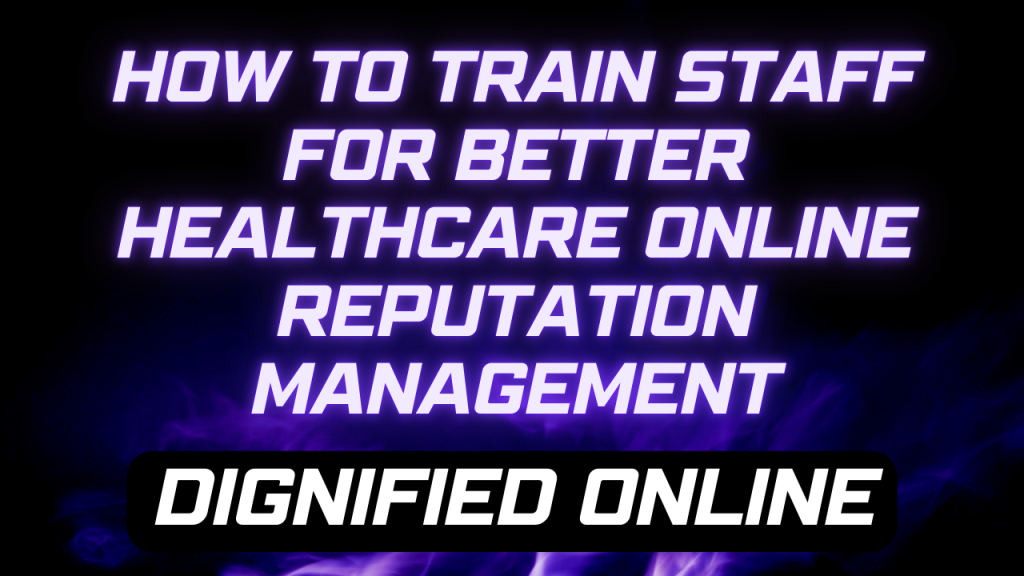Your front desk, nurses, and care teams all influence patient experience—and reviews. In today’s digital-first world, your healthcare practice’s online reputation can be just as important as your clinical outcomes. A five-star review can build trust before a patient even walks through your doors, while a negative one can turn potential patients away. That’s why staff training isn’t just about improving care—it’s about enhancing how that care is perceived and talked about online.
This blog will explore how training your team in communication, empathy, and strategic feedback requests can dramatically improve your healthcare organization’s online reputation. With insights from Dignified Online, a trusted leader in online reputation management, we’ll outline actionable strategies to empower your team and boost your digital presence from the inside out.
Why Online Reputation Starts at the Front Desk
First impressions matter, and in healthcare, that first impression often comes from a phone call or a greeting at the front desk. According to Dignified Online, many poor reviews don’t actually stem from clinical care but from how patients feel they were treated—especially by non-clinical staff.
Train your front-desk team to:
- Answer calls warmly and efficiently.
- Greet patients with eye contact and a smile.
- Offer clear instructions and manage wait times with empathy.
- Handle complaints or frustrations calmly and professionally.
Role-playing and communication workshops are great tools to reinforce these skills. When staff understand that they are the face of your brand, they’re more likely to align with a service-first mindset.
Clinical Staff and Compassionate Communication
Nurses, medical assistants, and technicians often spend the most time with patients. Their ability to communicate clearly, listen actively, and show empathy can determine how a patient perceives the entire visit.
Dignified Online emphasizes the importance of training clinical staff in both verbal and non-verbal communication. This includes:
- Active listening techniques (like paraphrasing and clarifying).
- Non-verbal cues like body language, eye contact, and posture.
- Avoiding medical jargon and explaining procedures in simple terms.
- Validating patient concerns and showing empathy—even when time is short.
When patients feel heard and respected, they’re much more likely to leave positive reviews and recommend your practice to others.
Encouraging Positive Reviews—Without Sounding Pushy
One of the biggest challenges practices face is getting satisfied patients to leave online reviews. Most patients who leave reviews do so because they’re either extremely pleased or extremely upset. The goal is to tip the scale in favor of positive experiences.
According to Dignified Online, training staff to ethically and tactfully ask for feedback is key. Here are a few best practices:
- After a successful visit, encourage staff to say: “If you had a good experience today, we’d really appreciate you sharing it online.”
- Include QR codes or links on discharge paperwork or appointment follow-ups.
- Train staff to identify happy patients (those who express gratitude or praise) and prompt them for a review while the experience is fresh.
It’s crucial to avoid anything that could be construed as coercion or review gating. Dignified Online works with practices to ensure compliance with review platform guidelines while still encouraging genuine, positive feedback.
Managing Negative Reviews Starts Before They Happen
Staff should also be trained on how to recognize and respond to dissatisfaction before it becomes a negative review. This means:
- Listening to concerns during the visit and escalating them appropriately.
- Empowering staff to apologize when things go wrong.
- Following up after the visit with a phone call or survey if issues were raised.
Dignified Online recommends building a culture where feedback is welcomed internally—not feared. Practices that embrace transparency and learn from patient input tend to receive fewer damaging reviews and more trust from the community.
Ongoing Training and Support
Healthcare reputation management is not a “set it and forget it” strategy. Continual reinforcement is necessary, especially in high-turnover environments. Partnering with a firm like Dignified Online can help provide ongoing training resources, review monitoring, and staff engagement programs that keep your team aligned and proactive.
In addition to on-site workshops, Dignified Online offers digital training modules, real-time feedback alerts, and monthly reporting to track improvements. These insights help healthcare leaders spot trends, recognize top-performing staff, and correct issues early.
Conclusion: Empower Your Staff, Protect Your Brand
Your reputation is built from the inside out. From the receptionist who answers the phone to the nurse who takes vitals, every staff member plays a role in how your healthcare practice is perceived online.
With proper training in communication, empathy, and review etiquette, your team becomes a powerful asset in shaping a five-star online presence. By partnering with experts like Dignified Online, you’ll not only gain tools to manage your reputation—you’ll build a culture that patients trust, appreciate, and want to talk about.

